Scott Sparling's Blog, page 5
June 6, 2011
The road begins and ends in McMinnville
On a summer night in 1989, the freight-riding careers of Spider Rider and Iron Legs Burk came to an end in McMinnville, Oregon. We were two Michigan kids who lived near the tracks and fell in love with trains in the early '70s. We both ended up – or ended up so far – in Oregon.
Nights and weekends, when we were young – when we should have been chasing girls, drinking beer, or stealing cars – we'd steal away to the railroad tracks instead and grab ladder rides. One day, we got in a boxcar and rode a couple hundred miles down to Elkhart, Indiana and back. When I got home, and my parents asked what I'd been up to, I answered, "Hangin' out with Deeg." That was his nickname. Freight stories were shared on a need-to-know basis back then, and our parents didn't need to know. They certainly didn't need to know our freight-hopping names.
After that, we were hooked, and we rode everywhere. Durand, Owosso, St. Paul, East Dubuque, Minot, Havre, Yakima, Spokane, Eureka, Petaluma, San Luis Obispo, Sacramento, Bakersfield, Barstow, Salt Lake City, Santa Fe, Denver, Grand Junction, Omaha – more towns than I can remember, though they're written in our journals. And all across Canada: Kamloops and Moose Jaw and Medicine Hat and…well, the unit trains, the one-a-days, the slugs, and the hotshots. Any train with fresh orders and hoses hooked, we rode.
______
By 1989, things had changed. We both had jobs. Jesse was married and I was about to be. Boxcars were in short supply, replaced by container trains, and empties were rarer still. And we had lost a step or two, or at least I had.
But one day, Jesse – Iron Legs – put out the call, as he always did. One more trip. Portland to McMinnville. Leave work early. Meet me on the bridge. I said yes, as I usually did.
We rode south and west all afternoon and into the evening, and when we jumped out in McMinnville, we might have said something like, "Maybe that'll be the last time ever." If that's what we said, we probably didn't really believe it. But here it is, twenty-plus years later, and our freight-riding days seem to be done. You never know, though – we'll both be in Michigan this summer, and if Jesse sees a slow-moving freight, well...I'll keep you posted. As things stand now, though, McMinnville was the end of the road.
______
So perhaps it's fitting that on June 16, at Third Street Books, McMinnville will be the beginning of the road for the Wire to Wire bookstore tour. Sure, there were a couple of warm-up dates out east last month. I read with a group of terrific Tin House writers at WORD in Brooklyn and the KGB Bar in Manhattan. Good places to loosen up and test things out.
[image error]
Warming up for McMinnville at the KGB Bar in Manhattan.
But McMinnville will be the first Oregon date, and the first time I read solo. Not even Iron Legs Burk will be there.
It's being billed as a workshop/reading, where I'll tell you everything I know about crime novels, which won't take long. So if you're anywhere near Third Street Books in McMinnville, Oregon on June 16, stop in and say hello.
When it's done, I'm taking a walk down to the freight yard for old time's sake, and you're welcome to come along.
_______________
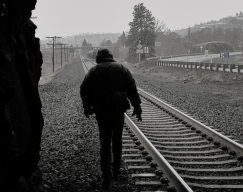
Iron Legs Burk in Oregon: Wanting things that can only be found in the Darkness on the Edge of Town.
May 15, 2011
"Stunning emotional depth"
The June Playboy has Lizzy Jagger undressed, but my favorite pic is the one of Wire to Wire next to a great short review by Anthony Vargas:
"In this impressive debut, Scott Sparling lends contemporary grunge to the genre as he embraces its trademark obsessions with sex, cash and dead ends. His all-too-human cast of contemporary boxcar drifters, glue sniffers and thugs is drawn in an impressionistic style that makes for stunning emotional depth."
The issue also features a food article by Jim Harrison and fiction by Robert Coover, so this month you really can buy it for the articles.
And in case Ms. Jagger wants to know, my turn-ons are Seger, power lines, and long romantic walks in the freight yard.
May 6, 2011
"Things on fire…"
Kirkus Reviews calls Wire to Wire "A dizzying, speed-laced debut novel...with plenty of peek-between-your-fingers moments for good measure." Including some combustible stuff. Here's the full review:
With Dexedrine-slamming rail riders, a glue-sniffing femme fatale and a lead protagonist whose point of view is skewed under the best of circumstances, the book is a worthy combination of Bob Seger nostalgia and dope-fueled noir, but it's not always the easiest story to follow. The framing device: video editor Michael Slater's editing suite, where the pill-popping film slicer screens scenes from his own life. Michael has never been quite the same since a peculiar, life-altering incident. While riding on top of a hurtling freight train with his amigo Harp Maitland, a power line zaps the young adventurer with 33,000 volts to the forehead. Now Slater has a head full of holes, and he sometimes sees people who aren't there.
From there, it's a hallucinatory road trip from Arizona to Michigan, which Slater describes in loving detail. It's a blistered postcard of passing Americana, stitched together with diners, pool halls and pickup trucks, not to mention the freight trains that Sparling himself rode.
Technically, it's a crime novel—there's violence and sex and things on fire. But it's obvious that the author is more interested in what's bouncing around in his hero's fractured head and spilling it out onto the page than he is in tidy endings. Slater explains his peculiar interests to a fellow traveler as a train narrowly misses a cow on the tracks. "I was disappointed," he says. "I wanted to see the cow explode. Things start to go wrong and I like to watch."
A strange, formidable novel about crossed signals and damage done, with plenty of peek-between-your-fingers moments for good measure.
I love that "violence and sex and things on fire" part, but also their tip that it's really not a crime novel in many ways. At least not to me. Though I would like to see a cow explode.
April 20, 2011
The Strip Club and the Grange
Okay, I didn't actually do a reading in a strip club, despite various statements that I may have made on Facebook and elsewhere. Not everything you read online is true – I mean, I'm trying to promote a book here.
And technically, I did do a little reading in a strip club – Portland's Club Rogue – but only as part of a video shoot for the book trailer. No one else was there except the film crew from Juliet Zulu, Tony Perez from Tin House, and Sandria Dore, a dancer who was oddly unimpressed to meet an author. Although that was in the script, so maybe she was just staying in character.
We were filming in Club Rogue because Michael Slater, one of the main characters in Wire to Wire, has a habit of going to strip clubs at various points in the book. He doesn't go to see naked women, however. He goes there to feel the fear of exposing his loneliness and need:
"One dancer in particular had his number. She made him look left, she made him look right. She had him on a little string. She was extremely good-looking and the fear she inspired scoured a month of crap off his soul."
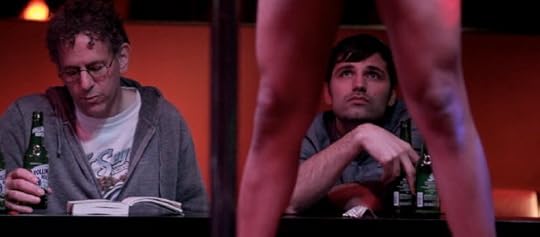
And yes, that's a Bob Seger t-shirt I'm wearing. Perhaps another reason why the stripper ignored me.
After the shoot, just to see what it felt like, I stood by the pole and read to the empty room as the film crew packed up. I'll be replicating this experience in bookstores soon, minus the pole, but hopefully with an audience. The tour schedule is here. Come and make it rain.
_____
I did, however, read, at the Springwater Grange in Estacada, Oregon, last Saturday night. Friends, acquaintances, and passers-by who were quick to believe that I gave a reading in an empty strip club were suddenly doubtful when I claimed to have read in the Grange Hall. People, you've got it backward – the Grange was amazing. Writers Night at the Grange was like three levels better than the best reading you can possibly imagine.
It attains that status through the goodwill, generous heart and friendship of Stevan Allred, who has organized the event for the Estacada Area Arts Commission for the past nine years, and from Joanna Rose, author of Little Miss Strange, who teaches with Stevan at the Pinewood Table and shares the stage with him at the Grange.
Every year, a third person is invited to join in reading – often one of their students – and this year it was me. Go ahead, take a guess as to how many people come out on a Saturday night in Estacada to hear writers read. Nope, you're low. Double it. Still low. I counted nearly 70 people. It was an amazing experience – a perfect, confidence-building way to debut Wire to Wire and start the book tour.
The theme of the night was On the Road. Joanna read a beautiful piece about a road trip through rural Oregon, snow, and memories. Stevan read an essay about a real 1970s freight-hopping trip that took me back to my youth – reminding me that, originally, I jumped freight trains for the same reason Slater visits strip clubs – to scour the fear off my soul.
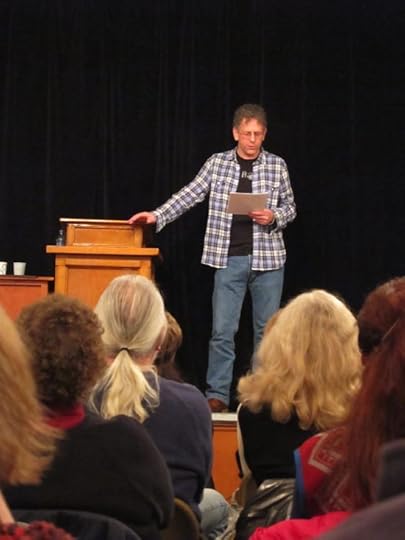
After the reading, there was a huge party at Stevan's house, as there is every year. When I say it was a terrific time, that's true. When I say I regret starting a fight and stabbing a guy, that's not. But feel free to spread the rumor. I've got a book to promote, and I could use the buzz.
Thanks to Juliet Zulu for the production still at Club Rogue, and fellow writer and previous Grange-reader Steve Denniston for the shot of me at the podium.
_________

Say it takes you an hour to drive through rural Oregon to the Springwater Grange. Say you've been waiting for this all your life. Roll down the window and play this fucking loud. Steve Earle, "Feel Alright."
April 10, 2011
Louder
Next weekend I'm reading an excerpt from Wire to Wire at the Springwater Grange in Estacada, Oregon. It's a big room, and I've been practicing for it, working on getting it loud.
I can do loud, but I don't do it naturally. My speaking voice is normally a little bit quiet. In fact, a long time ago I adopted the line from the B-side song "The Quiet One" by The Who: I ain't quiet – everybody else is too loud. (For younger readers, The Who are an a cappella group from Leeds, known for their delicate harmonies.)
On the other hand, when I started learning fiction, my writing voice was the opposite of my speaking voice: I always wanted the writing to be loud. A blast of voice is how I would describe my early style now, though at the time I called it incantatory – because I had read that Kerouac and Joseph Conrad, both of whom I liked, were incantatory writers. I wanted sentences that went on for pages, doubled back on themselves, and emptied the bench of every punctuation mark known to man, especially semi-colons. Dashes were good too.
Of course, I was doing this at about the same time Raymond Carver was revitalizing the short story with short, direct sentences that displayed exactly the opposite signal to noise ratio. (In Carver's case, all signal, no noise.) My allegiance to the sound of a sentence (caring more about how the syllables fell than the story being told, would be a harsh way of putting it) might have been an early warning sign of the long road ahead. But I wasn't deterred.
In fact, I once sent a friend an unmarked cassette tape with a message, written in Sharpie, probably in all caps, that said: "This is how I want my writing to sound." On the tape was an Elvin Jones drum solo. I bought some of his albums to listen to when I wrote.
(And I still have them. Filed under J right next to Joan Jett. Go ahead - imagine me as a vinyl aficionado if you like. It's not really true, but I like the way aficionado sounds on the page. Which explains why I once changed my name to Johnny Revillagegado for a very brief time. But that's a whole nother post, as we would say in Michigan.)
Eventually I finished a story built around voice. It opened like this:
It was a new time and we rode slam hard, rode it on flatcars and hoppers and bulkhead flats, in empty woodchip cars, gons, auto ramps, and piggies all over the west, the prairies and dirty western towns of district nine, Kalama, Lillooet, Sutter's Portage, dozens of towns seen from the frame of a boxcar and eyes numb past blinking. Towns of dust where dirty kids threw rocks at the train – in laziness, not maliciously – and empty towns on the straight flat where the last lit beer sign burned thirty miles into the night.
The story worked, sort of – it got published in a low-circulation newsletter – but soon I discovered the limitations of voice (like the problem of wearing the reader out). And I started reading Robert Stone. Since then I've read the opening sentence of Dog Soldiers about 7,000 times. "There was only one bench open in the shade and Converse went for it, although it was already occupied." A setting, a character, and an action, all in 19 fairly quiet words. My admiration for that, and for the rest of the book, started me on a new path – one of looking beyond voice. Beyond loud.
_____
I would still be lost on that path today – wandering through the woods, eating acorns, clutching an unfinished manuscript for warmth – were it not for Stevan Allred and Joanna Rose. Stevan and Joanna teach writers in Portland at The Pinewood Table, named for the table in Joanna's living room. I joined the group in the early 2000s, thinking I would stay for five weeks or so. I stayed for five years instead. I read every word of Wire to Wire around that table; the parts that puzzled me most (and there were lots of them) I read two or three times. If not for Stevan and Joanna and the other writers at the table (from whom I learned nearly as much) there would be no book, no blog, no readings. Among the many things I learned at that table was when and how to stop writing Wire to Wire.
Stevan and Joanna are both reading at the Grange this coming weekend – Stevan organizes the Writers Night event once a year. This year, the theme is "On the road." I'm thrilled to be reading there with them. I'll be going to a lot of great bookstores this summer – places I've always dreamed of reading. But nothing could be more perfect than starting with Stevan and Joanna at the Springwater Grange in Estacada.
As far as I'm concerned, if you can make it there, you can make it anywhere.
____
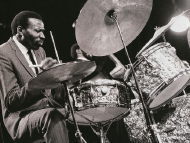
Elvin Jones explains how to build a drum solo around the melody of "Three Card Molly."
March 26, 2011
Crossing the Big Lake
When you're growing up, you see the world at a certain scale. And if you grew up on the outskirts of a small town in southern Michigan, years ago, that scale was pretty small.
I can remember two things that shook my sense of size when I was a kid. One was the Ford Rotunda in Detroit. Like thousands of other families, we went there to see the Christmas display – before it burned down. The other world shaker for me was the fleet of Ann Arbor Railroad ferries – mammoth ships that carried entire freight trains across Lake Michigan. I didn't have any idea what big was about until I saw those ships.
The railroad ferries also carried passengers across the Big Lake, from Northern Michigan to Northern Wisconsin and back. These ships were so foreign to our experience, that my friend Deeg (that was his name at the time; it keeps changing) speculated that a ticket to Wisconsin would certainly cost $100 or more. I happened to know it cost only $10, and began to plot ways of tricking the other $90 out of him. A few years later, Deeg or Doug or Jesse or D.C. or whatever he's calling himself these days, showed me how to hop freights, and the situation was reversed: he knew stuff I didn't, like what it meant when the hoses were hooked, and which boxcars would be set out first on a train. To his credit, he never tried to trick me.
As I wrote Wire to Wire, set in the Michigan of my imagination, I knew I had to include the railroad ferries. I discovered it was hard to write about something so big. I found myself putting mammoth in every sentence. The cliché "as long as a football field" kept trying to get in the prose. In the end, I'm not sure I captured how much space they filled up in my head. They were freakin' big.
Of course, by the time I finished the manuscript, I'd learned it was the small things – words that aren't said, a touch, a glimpse of loneliness or friendship – that really matter, and that they are even harder to put on the page.
The ferries still stun me though. I'm going back to Michigan this summer – the schedule for the W2W reading tour is up on the Events page – and though the railroad ferries are gone, some of their car ferry cousins still remain. I hope I get a chance to ride them again.
_______________
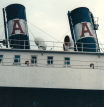
"Swimming in the Big Lake, taking it easy." Bob Seger's "Brave Strangers." You weren't expecting "The Wreck of the Edmund Fitzgerald," I hope.
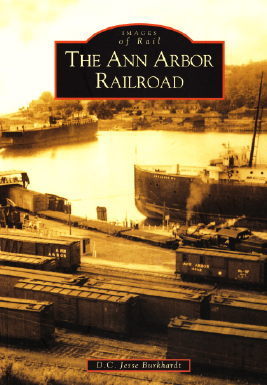
A definitive look at the Ann Arbor Railroad
and ferries by D.C. Jesse Burkhardt, who
would gladly pay $100 to ride them.
____
A small excerpt of footage shot by David C. Beardslee. A longer DVD is available
from the Ann Arbor Rail Road Technical and Historical Association (AARRT&HA).

Jesse Burkhardt looks out at the ferry in the 1980s. "Look closely," he writes, "and you'll
see by this time the yard tracks were gone; there was nothing to feed the idled carferry."
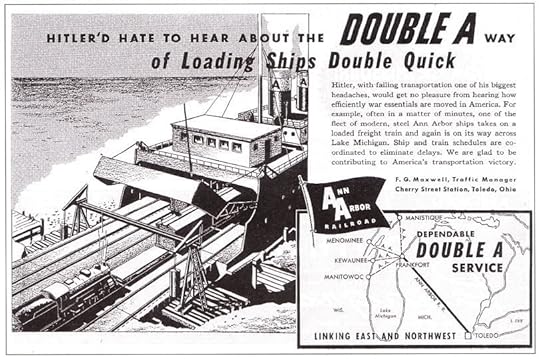
It's hard to imagine Hitler being too worried about the Ann Arbor Railroad, but some
copywriter decided to give it a try. Image from The Ann Arbor Railroad by D. C. Jesse Burkhardt.
Top of page
March 22, 2011
This is not my book
Wire to Wire: Inside the 1984 Detroit Tigers Championship Season is not my book. Though in a way it is. This other Wire to Wire, written by George Cantor and published in 2004, chronicles the magical year when the Tigers opened the season with a 19-1 record.
Imagine it happening day by day. 19 wins. One loss. A few weeks later they were 35-5. During the first quarter of that season, the Tigers were virtually unbeatable. Argue great teams all you want, but based on that win-loss record, no team in baseball has ever been that good, before or since.

The Tigers won the pennant and the World Series wire to wire that year – meaning they were in first place every day of the season. Only two other teams had ever done that in over 100 years of baseball.
I took that as a freaking sign. I named my book after it. (Cantor's book, I might add, had not been written yet.)
Later, I wrote to Jesse Burkhardt about my decision to quit my job and write a book. Jesse is also Iron Legs Burk, who showed me how to hop freights. He saved the letter for a decade or two, and today he mailed it back to me.

To be clear, my Wire to Wire has nothing to do with baseball. The Tigers aren't even mentioned. (Well, actually, there's a little play by play in the background of one scene, an argument. If you read the book and you're from Michigan, imagine the great Ernie Harwell calling the plays as Harp and Lane shout at each other.)
Stripped of the Tigers' connection, the phrase wire to wire had to find its own meaning in my story. And eventually it did. The necessity of discovering what it meant was a blessing I didn't recognize at first.
The letter continues:
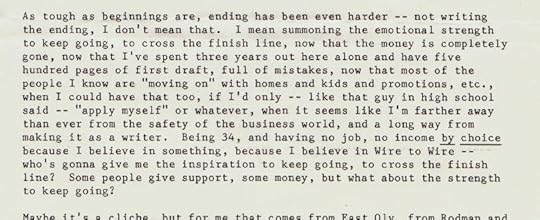
Near the end of the letter, the younger me also writes this to Jesse: "There's a line in my book that says 'we rode the rails and we kept going long after most people would have quit.'" That particular line is no longer in the book – the voice is wrong – but now it seems to apply as much to writing as it did to riding. I kept going. The strength came from a lot of people, Jesse and many others. It came from music, my family, from random good luck that fell on me for no reason – and even from a baseball team that, during one amazing year, simply couldn't lose.
______
I'm part way through Cantor's book, by the way, and if you're a baseball fan, or a Sparky Anderson fan, I think you'd enjoy it. I also have a new phrase in my head – a phrase that still needs to find its meaning. I'm taking that as another good sign.
______
 In a world like this, you need a heart like Jon Dee Graham's. So you don't get "Faithless."
In a world like this, you need a heart like Jon Dee Graham's. So you don't get "Faithless."
March 13, 2011
What dreams are really made of
I'm unclear about the rule concerning dreams and fiction. Some say you should never write about dreams – after all, fiction is itself a kind of dream, so any dream you put in a book is automatically a dream within a dream. Plus they're just never as interesting as real life ('real' fictional life, I mean).
Others say dreams are like sex scenes – they're okay as long as they're justified, but keep it short and no more than three per book.
Wire to Wire includes five dreams, but three of them are super short – a sentence or less – so I think I'm under the limit. (You'll have to count the sex scenes yourself.)
The desire to write about dreams is understandable, though. There you are, struggling to create a believable imaginary world, and every night your subconscious is churning out a nonstop stream of surreal, autobiographical fiction. Why not use some of that stuff? Plus, no one wants to hear about your lousy dreams in real life, so your only option for sharing is to put them in your book.
(For the record, none of the dreams presented in Wire to Wire started out as actual dreams, except one. And it's not the Blowjob Dream. I wish.)
Still, I do agree that you have to be very careful about using dreams in stories. By their nature – ephemeral and shifting and unreliable – dreams lack many of the things that make fiction seem real to the reader.
Happily, there are no restrictions about using dreams in blogs. In my view, anyway, blogs are like early Deadwood episodes. It's a land with no rules and anything goes – at least until George Hearst shows up and spoils everything.
So in that spirit, I present: Things I've learned from my dreams in just the last seven nights.
If your testicles come off, go to whatever hospital is close by. Don't try to drive to a better hospital way across town, because you'll inevitably get drawn into some other scenario, like a pick-up basketball game. And you'll never get your testicles back on.
If there's a switch on your desk that turns gravity on and off, make sure there's a similar switch on the ceiling.
A screen door mounted with duct tape instead of hinges is not adequate protection against albino wolves.
Also, if you attach your screen door using duct tape, try giving your roommate a heads-up, so he doesn't accidentally rip it off just as the albino wolves are approaching.
Strippers prefer customers who smell nice over customers who look nice. (Actually, I didn't learn this from a dream. I learned it from Twitter. Strippers are among the most interesting people on Twitter, in my opinion. Generally, they aren't there to promote something the way the rest of us are – they're just sharing their observations about their generally crappy but interesting jobs. Most of them – at least the ones I follow – seem pretty empowered. Their jobs have many of the same drawbacks that our jobs have, but intensely amplified, so there's more drama. And the language of strip clubs completely lacks the deadness of the non-stripping world. This particular observation about good-smelling custys comes from StripperTweets – currently tweeting from Austin, where she is on a panel about interactive something-or-other at SXSW. I've also learned a lot from K to the A to the T. I hope to meet them both someday and buy a table dance, or at least give them an ARC.)
If there's any sort of high school gym involved in your dream, trouble will follow. Locker rooms are especially bad.
Sex in the subconscious is almost always a one-dream stand.
If you order a drink at a coffeeshop, and another customer picks it up, hit them with a blindside tackle, pin them to the floor, and lecture them about their incredible sense of entitlement. (More of a fantasy than a dream, admittedly.)
And finally, if you're standing in the living room of a house you no longer own, and a tornado is coming your way, perfectly framed in the picture window, don't try to take a photo of it with your Nikon camera, because there won't be any film in the camera, and even if you have a spare roll somewhere, you will have forgotten how to load it.
This last one is a hard lesson to learn. It make take 40 or 50 repetitions of this dream before you get the point. Going digital won't help, either. The camera jams.
Here's what puzzles me though: I never dream about my book. I dream about my dad, mom, wife, son, sister, and friends. I dream about freight trains, Michigan, Bob Seger, my job, and sex. I dream about editing my college newspaper (the pages are all blank). Why no dreams about the thing I've dreamt of most?
______

Michigan Dreams: "There are phantoms all around me, but they're just beyond my grasp." Country Joe and the Fish, "Bass Strings."
March 4, 2011
Rules for SXSW
Time to switch all obsessing from fiction to music. SXSW is ten days away. Ears Two is sending spreadsheets almost hourly, mapping out which bands we must hear. (You remember Ears Two, my SXSW cohort with encyclopedic music knowledge.) The company laptop is jammed with sample mp3s and flashing "Low on Disk Space."
Before things get any further out of control, here's a partial list of rules for enjoying SXSW.
Arrive early. Stay late.
Don't be greedy. Aim for one transcendent musical experience per day. Just have fun the rest of the time. (This one is tough. We want every set to be stellar.)
Build your schedule around Jon Dee Graham and Alejandro Escovedo. Fill in the blanks with everyone else.
But also, don't follow your schedule or you'll miss all the good stuff. Improvise. Give miracles a chance.
Get totally blown away by at least one band/singer you thought you'd hate. Get totally disappointed by at least one band/singer you thought you'd love.
No matter where you are, something better is happening somewhere else. Get used to it.
Crowds in the street are not a sign of good music inside.
If you meet the Buddha on the road, ask him if Mary Lou Lord is in town.
Avoid grackles.
The five-second rule does not apply to earplugs. When it hits the ground, it's gone. Carry extra.
Do not try to live-tweet the festival.
Do try to find the cab driver with the big Tupperware container of frozen vegetables so you can work his profane dialogue into your next story.
Do not buy a guitar.
The festival is not a success unless you completely fill up an Amy's ice cream punch card and get a free scoop at the airport the morning you leave.
It is okay to let people assume that, given your age and your badge, you must be a record producer or some other type of VIP. It is not okay to tell people that you have copyrighted the phrase "Check Check" or "Testing One Two." Do not attempt to collect royalties for same.
When the temptation to get a tattoo or a cowboy hat becomes too strong, head home.
From SXSW 2009 -- Five days in three minutes.
March 3, 2011
Things to worry about, and having faith
When my son was one minute old, he taught me something about life. The nurse handed him to me and in those first few seconds, I felt relief. The months of anxiety were over. My naïve thought was: I can stop worrying now. I held onto that belief for as long as it took to exhale and draw in one breath. Then I realized my worries weren't over. They were just beginning.
So I guess what I learned was: It never ends.
Zane's eighteen now. Things have more or less worked out. Still, last night my wife woke up around midnight, worried that he didn't have enough gas to get to school in the morning. I could hear rain hitting the window. I almost asked if she wanted me to go out and check the gauge. But I didn't. Never ask a question you don't want to know the answer to.
A manuscript is like a kid that way, at least for me. The day Tin House said they'd take my book, I thought I'd reached the finish line. Instead, there's a whole new universe of things to obsess over. Should I be promoting it more? Am I tweeting too much? What if Tin House has changed their mind about publishing it? I haven't heard from them in a while. Should I call them just to be sure? What about reviews? Should I even read them?
Last Sunday I finished Tom Grimes' brilliant memoir, Mentor. It's the story of Grimes' life as a writer and his time at the Iowa Writers' Workshop. Grimes' mentor is Frank Conroy; their relationship is at the heart of the story. It's an amazing book. Publishers Weekly gave it a starred review.
Initially, I thought the appeal of reading Mentor would be in seeing the path I didn't take. At about the same time Grimes went to Iowa, I quit my day job, started freelancing and tried to teach myself to write fiction. I thought it would take five years. It took much longer.
But although those two paths are different, they have something in common. A writer's life is irrational, as Grimes says Conroy says. And you inflict all sorts of crap on yourself along the way. Irrational worries. Twice I put the book down and said, that's enough. It's too close to the bone. The problem is, it's not the kind of book you can stop reading.
When I finished Mentor on Sunday night, one gift it gave me was a sense of resolve. I promised myself not to let the world define Wire to Wire for me. Reviews don't matter.
The world, being a kind and gentle place, let me hold onto that belief for almost 12 hours before outing me as a hypocrite. The next morning Publishers Weekly gave Wire to Wire a starred review and made it Pick of the Week.
So hold that thought. It turns out reviews do matter. As long as they're good. As for my resolve not to read them…hey, revision is everything in writing. That includes revising my beliefs.
Somebody tell me if I'm tweeting too much, though.
_____
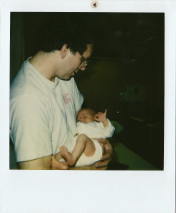
Sometimes you gotta lose it, just to lose it, just to find it again: Alejandro Escovedo says you gotta have "Faith."



